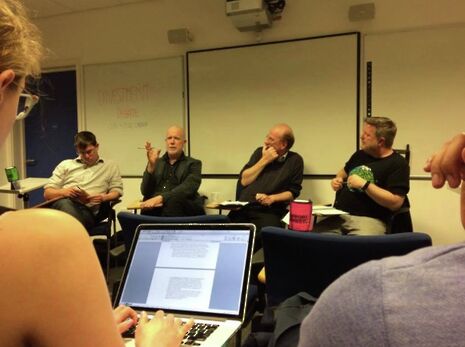Cambridge debates the future of divestment
The panel discussion drew together academics and campaigners to discuss the progress of the divestment campaign

On Monday, Cambridge University Amnesty International (CUAI) and Cambridge Zero Carbon Society (ZC) hosted a panel discussion on the current state of the divestment movement.
Speaking to an audience of around twenty people at the Alison Richard Building on Sidgwick Site, a diverse panel of academics, activists, and professionals reviewed the progress made in the push to divest the University’s investment assets from the fossil fuel industry, as well with the challenges still facing the movement.
Featured on the panel were Dr Matthew Rendall, a lecturer in Politics and International Relations at the University of Nottingham; Ian Ralls, a coordinator for Cambridge Friends of the Earth; Richard Baxter, a campaigner for Bristol East Greenpeace; and Dr James Smith, a public health doctor and General Practitioner based in Cambridge.
The panellists opened the discussion by offering individual thoughts on the utility of pursuing a divestment policy as part of a broader push to combat climate change. Rendall began by framing climate action as an economic and ethical issue, and invited the audience to consider whether divestment should be evaluated in terms of its intentions, or by its outcomes instead. “If [divesting] does result in some sort of [financial] loss,” he asked, “will these sacrifices be justified if it didn’t actually reduce the amount of overall investment in fossil fuels?”
Baxter continued the discussion with his experiences organising student action at the University of Bristol, which announced in March that it would withdraw its endowment assets from the fossil fuel industry. “It’s a case of making sure that you’ve got as many groups that have a stake in the decision as possible,” he said, stressing the need to engage with academics “resistant” to potentially jeopardising sponsorship from the fossil fuel sector. Baxter added that cuts to research funding were “collateral damage” and a “sacrifice that universities might have to make” in order to take an active stance against climate change.
Ralls, meanwhile, noted the “public health risks and financial consequences of continued investment in fossil fuels”. He drew comparisons between the fossil fuel industry and the asbestos scandal, arguing that both industries had been built on relentless use of a practical but harmful material.
Smith remarked that “the real value of divestment is that it helps you reframe the conversation about climate change”. Moving beyond the predictions of climate models to instead focus on ideas of a “carbon budget” or “carbon bubble”, he continued, enables activists to present climate action as a financially prudent risk management strategy suited to pension funds and corporations.
The floor was then opened to questions and comments from the audience, which drew on topics ranging from how far carbon-intensive industries can be environmentally responsible, and ways of encouraging unresponsive industries to take action on climate change.
The discussion comes after a Grace was approved in January by Regent House calling for the University to fully divest from fossil fuels. However, the University Council, the body directly responsible for the University’s investments, has traditionally been resistant to such a move. A future decision on divestment rests on the findings of a report into the issue commissioned by the University Council.
Rufus Jordana from ZC explained to Varsity that the event was a chance for speakers and audience members to exchange opinions and develop a broader understanding of the divestment movement. Elle Turnbull, Publicity Officer for CUAI, added that it was also an opportunity to “consider where Zero Carbon will go next with their campaign”.
 News / Colleges charge different rents for the same Castle Street accommodation2 March 2026
News / Colleges charge different rents for the same Castle Street accommodation2 March 2026 News / King’s hosts open iftar for Ramadan3 March 2026
News / King’s hosts open iftar for Ramadan3 March 2026 Theatre / Lunatics and leisure centres 4 March 2026
Theatre / Lunatics and leisure centres 4 March 2026 News / Angela Merkel among Cambridge honorary degree nominees27 February 2026
News / Angela Merkel among Cambridge honorary degree nominees27 February 2026 News / News in Brief: waterworks, wine woes, and workplace wins 1 March 2026
News / News in Brief: waterworks, wine woes, and workplace wins 1 March 2026







